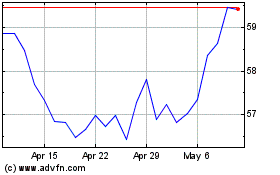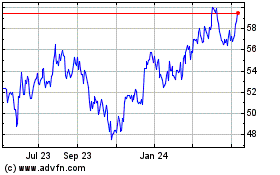By Rick Carew, Shayndi Raice and Eyk Henning
China National Chemical Corp. is nearing an agreement to buy
Swiss pesticide and seed giant Syngenta AG for roughly $43 billion,
according to people familiar with the matter--a move that would
mark one of China's most ambitious attempts at an overseas
acquisition.
Big obstacles remain to completing a deal. People familiar with
the matter said an agreement between the two companies could be
announced as soon as Wednesday, but also cautioned that talks could
still fall apart. If an agreement is reached, it would be just the
beginning of what promises to be a fraught process gaining
government and regulatory approval around the world, including in
the U.S., the home of a sizable portion of Syngenta's seed and
crop-spray business.
Another suitor could also emerge. The global agricultural and
chemicals industries have been scrambled in recent months by a bevy
of deal making, kicked off by U.S. seed giant Monsanto Co.'s
unsuccessful $46 billion takeover of Syngenta itself.
Terms of the deal with China National Chemical, known as
ChemChina, call for a price of about 470 Swiss francs in cash, or
$461, a share, according to people familiar with the matter.
Bankers and investors have said it would be difficult for Monsanto,
or any other suitor, to match such an all-cash offer.
If consummated, the transaction would represent the largest
foreign acquisition by a Chinese company by a long shot. That honor
is now held by Cnooc Ltd.'s 2013 purchase of Canada's Nexen, an oil
producer, for $18.2 billion.
Shares in Syngenta rose sharply after The Wall Street Journal
reported the talks earlier Tuesday. Syngenta is due to report 2015
full-year financial results on Wednesday.
A deal would need to pass a gauntlet of regulatory examinations
in Europe and the U.S., which bankers and lawyers said could prove
difficult. They said that U.S. authorities would scrutinize the
transaction. About a quarter of Syngenta's sales come from North
America.
The company is the top pesticide seller in North America in
terms of sales, and it sells 10% of soybean seeds in the U.S. and
6% of U.S. corn seeds. The company was created in 2000 through the
merger of the agribusiness operations of European pharmaceutical
giants Novartis AG and AstraZeneca PLC.
The talks come amid global concerns about China's slowing
economy and Beijing's attempts at managing that slowdown, partly by
orchestrating a gradual easing of the country's currency. That has
whipsawed not only the country's domestic stock markets, but also
global shares, bonds and currencies--while contributing to a sharp
fall in commodities prices world-wide.
Bankers said that a recent flurry of takeovers by Chinese
acquirers may suggest executives there are expecting more
depreciation is on the way. Doing deals now would make more sense
for Chinese buyers then later, when any overseas acquisitions could
be more expensive.
Despite economic headwinds at home, Chinese companies last year
spent more than $112 billion on acquisitions across the globe,
according to Dealogic. ChemChina has been especially prolific. Last
month, it agreed to buy Munich-based equipment maker KraussMaffei
Group for $1 billion. The same month, it took a 12% stake in
Mercuria Energy Group, a large, privately held energy trader, for
an undisclosed sum.
The deal would mark further consolidation of the seed and
pesticide sectors after DuPont Co. and Dow Chemical Co. announced
their merger in December. Monsanto last spring set off the current
deal-making wave in the chemicals sector when it proposed to buy
Syngenta.
After unsuccessfully courting Syngenta investors and sweetening
its offer to $46 billion in cash and stock, Monsanto dropped its
pursuit in August. That left many of Syngenta's shareholders
frustrated because of a steep decline in the Swiss company's share
price amid a grim outlook for the sector.
Syngenta's chief executive at the time retired and John Ramsay,
its interim CEO, has said that the company was discussing possible
deals with multiple parties, a shift in its initial resistance to a
takeover. People familiar with the matter had said that ChemChina
was interested in acquiring Syngenta.
Any deal would likely need to get approval from the Committee on
Foreign Investment in the U.S., or CFIUS, the federal body that
screens corporate takeovers for security concerns. Chinese
acquisitions have undergone more intense scrutiny in the U.S. in
recent years.
CFIUS, for instance, quashed a deal earlier this year by a
Chinese investment fund to buy the lighting business of Philips NV.
The unit had manufacturing, and research-and-development facilities
in the U.S. It is unclear if Syngenta's pesticide and seed
businesses would raise the same sort of national-security issues
that deal raised.
"Regulatory risk appears significant," wrote analysts at Credit
Suisse, citing Syngenta's research and development, and
crop-protection portfolio.
ChemChina is already one of China's biggest and most ambitious
state-owned enterprises. The closely held company employs 140,000
people and delivered sales of 240 billion yuan ($36.5 billion) in
2013, according to its website.
The company, led by founder Ren Jianxin, has worked in recent
years to present itself as an open and globally minded enterprise.
Many of its Chinese state-owned competitors shy away from
international attention.
After ChemChina agreed to buy tire maker Pirelli & C. SpA of
Italy last year, top Chinese executives including Mr. Ren hosted a
nearly three-hour briefing for foreign journalists at ChemChina's
headquarters in Beijing. Executives gushed over their love of
European soccer and history, and pledged at the time to uphold the
Italian company's autonomy.
Mr. Ren is something of an oddity inside the patchwork of
China's mammoth state-owned enterprises. Unlike many state-owned
companies today, which were born out of reforming government
ministries in the 1980s, Mr. Ren built his company from the ground
up.
He first founded a chemical company called China National
Bluestar Group Co. in 1984 with a 10,000 yuan loan in the far-west
industrial city of Lanzhou. As part of a government-initiated
restructuring in 2004, Mr. Ren's company was absorbed by ChemChina,
where Mr. Ren was installed as the company's president.
Jacob Bunge and Brian Spegele contributed to this article.
Write to Rick Carew at rick.carew@wsj.com, Shayndi Raice at
shayndi.raice@wsj.com and Eyk Henning at eyk.henning@wsj.com
(END) Dow Jones Newswires
February 02, 2016 13:53 ET (18:53 GMT)
Copyright (c) 2016 Dow Jones & Company, Inc.
Dow (NYSE:DOW)
Historical Stock Chart
From Mar 2024 to Apr 2024

Dow (NYSE:DOW)
Historical Stock Chart
From Apr 2023 to Apr 2024
